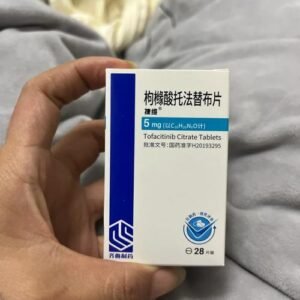bozitinib capsule 伯瑞替尼
Baritinib is an oral tyrosine kinase inhibitor (TKI), mainly used to treat ALK-positive advanced or metastatic non-small cell lung cancer (NSCLC). It blocks the growth signal transduction of tumor cells by inhibiting the activity of ALK fusion protein, thereby delaying the progression of the disease. The drug needs to be used under the guidance of a doctor, and the specific efficacy and safety vary from person to person.
Mechanism of action and indications
Mechanism of action: Berretinib selectively inhibits the activity of kinases such as ALK and MET, blocks abnormal signaling pathways, and inhibits tumor proliferation and metastasis.
Indications: Suitable for patients with ALK-positive non-small cell lung cancer, especially those who are resistant or intolerant to first-generation ALK inhibitors (such as crizotinib).
Usage and dosage
Dosage: Oral, usually once a day, on an empty stomach or with meals.
Dose adjustment: The dose needs to be adjusted according to the patient’s tolerance, liver and kidney function, and adverse reactions. Do not increase or decrease or stop the drug on your own.
Common adverse reactions
Digestive system: Nausea, diarrhea, vomiting, etc.
Systemic reactions: fatigue, edema.
Cardiovascular system: bradycardia, increased blood pressure.
Abnormal laboratory indicators: abnormal liver function (such as elevated transaminases), elevated blood creatine phosphokinase, etc.
Precautions and contraindications
Pre-drug examination: It is necessary to confirm the ALK gene mutation status and evaluate liver and kidney function, electrocardiogram, etc.
Drug interactions: Avoid combined use with strong CYP3A4 inhibitors or inducers, which may affect drug efficacy or increase toxicity.
Special population: Pregnant women are prohibited from using it, and patients of childbearing age need to take contraceptive measures; breastfeeding women should suspend breastfeeding.
Efficacy and limitations
Clinical data: Studies have shown that beretinib has a higher objective response rate (ORR) and longer progression-free survival (PFS) for ALK-positive patients.
Drug resistance: Similar to other TKI drugs, long-term use may lead to drug resistance, and subsequent treatment plans need to be adjusted through genetic testing.
Important Tips: Berretinib is a prescription drug. It must be evaluated by a professional doctor before use. During treatment, adverse reactions must be monitored regularly and medical treatment must be sought in a timely manner. Patients are not allowed to purchase drugs or adjust treatment plans on their own.
View more
Share:
Products
Our offers
Health Classification
Let us work together to protect precious health




























